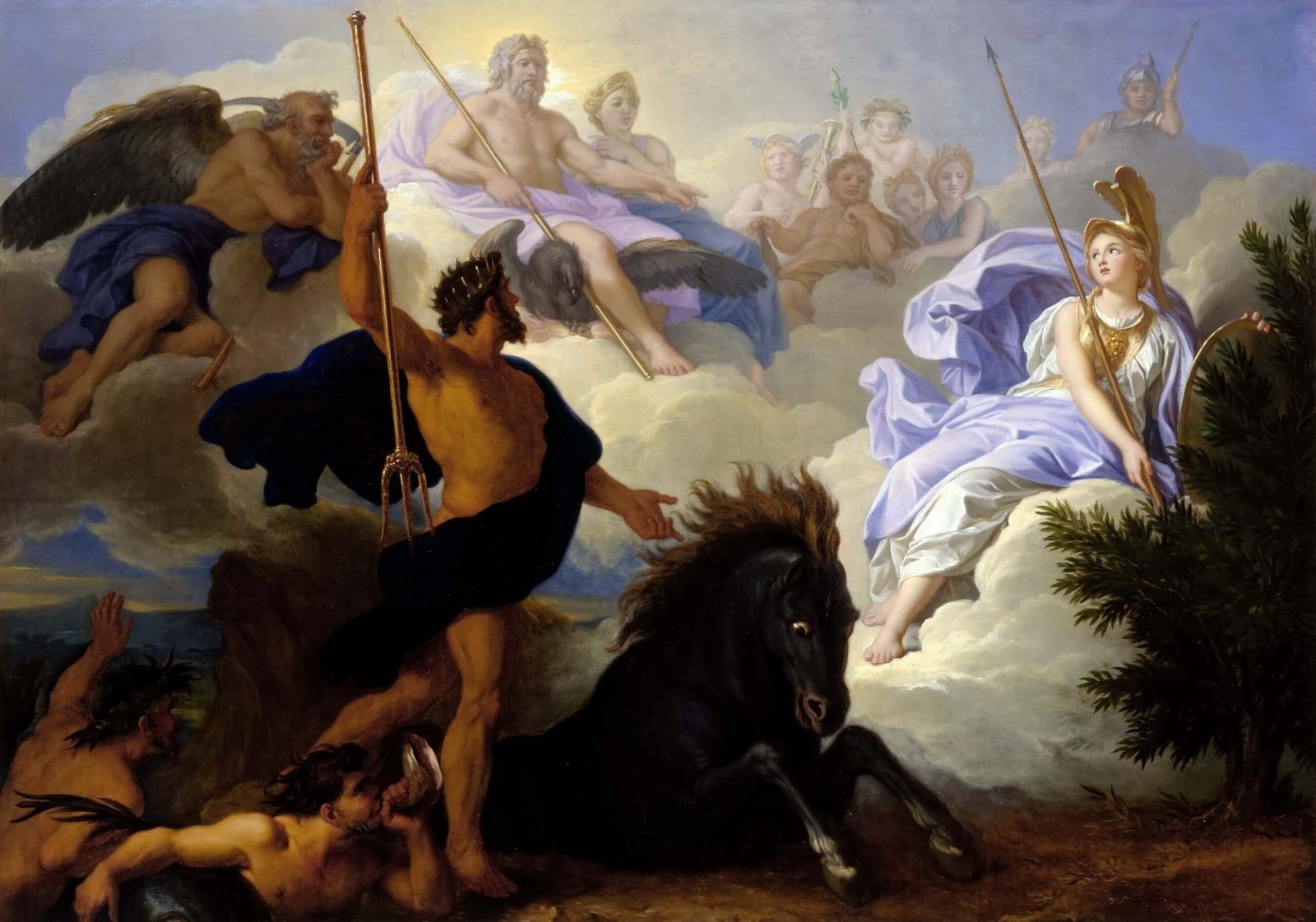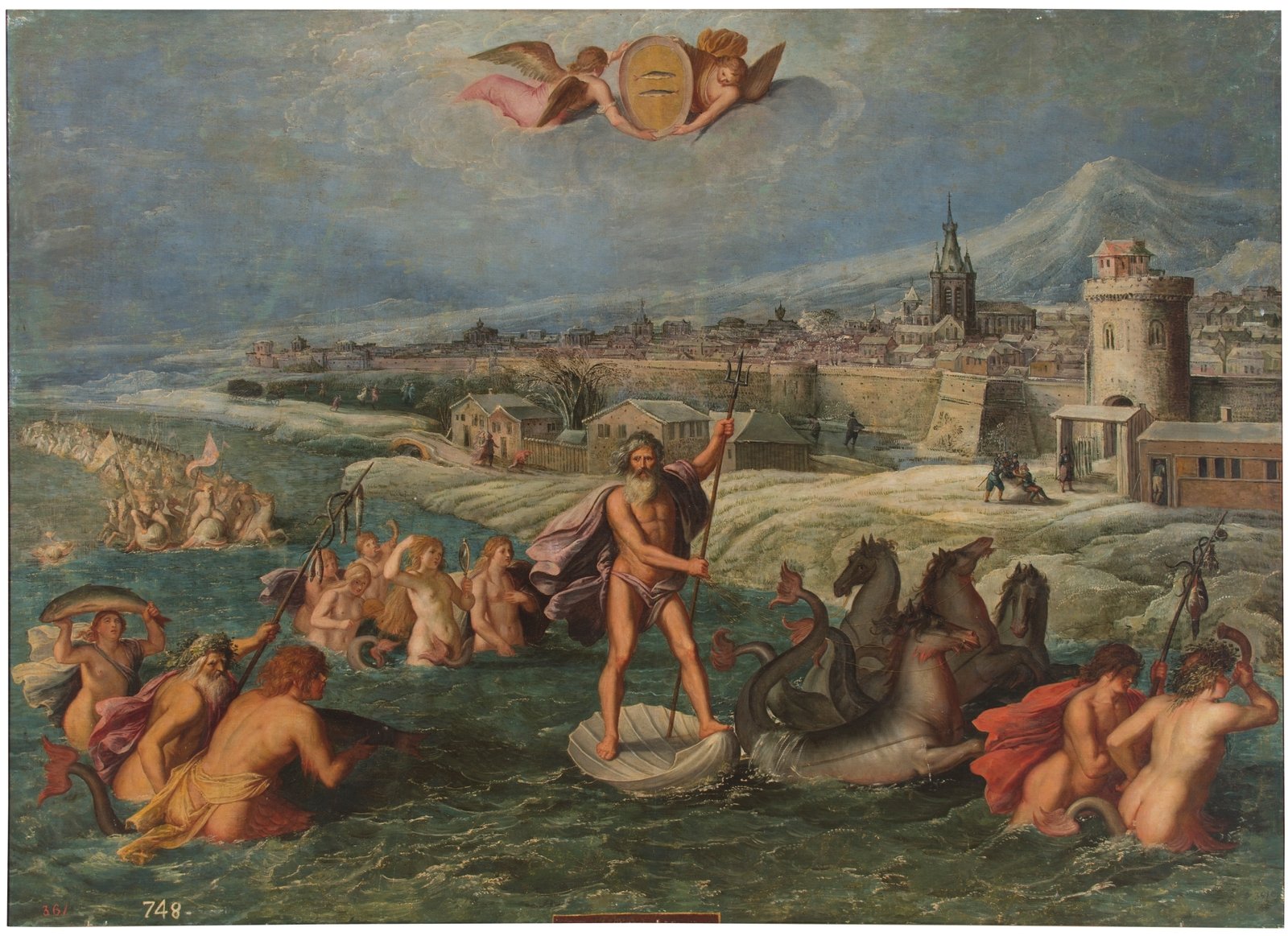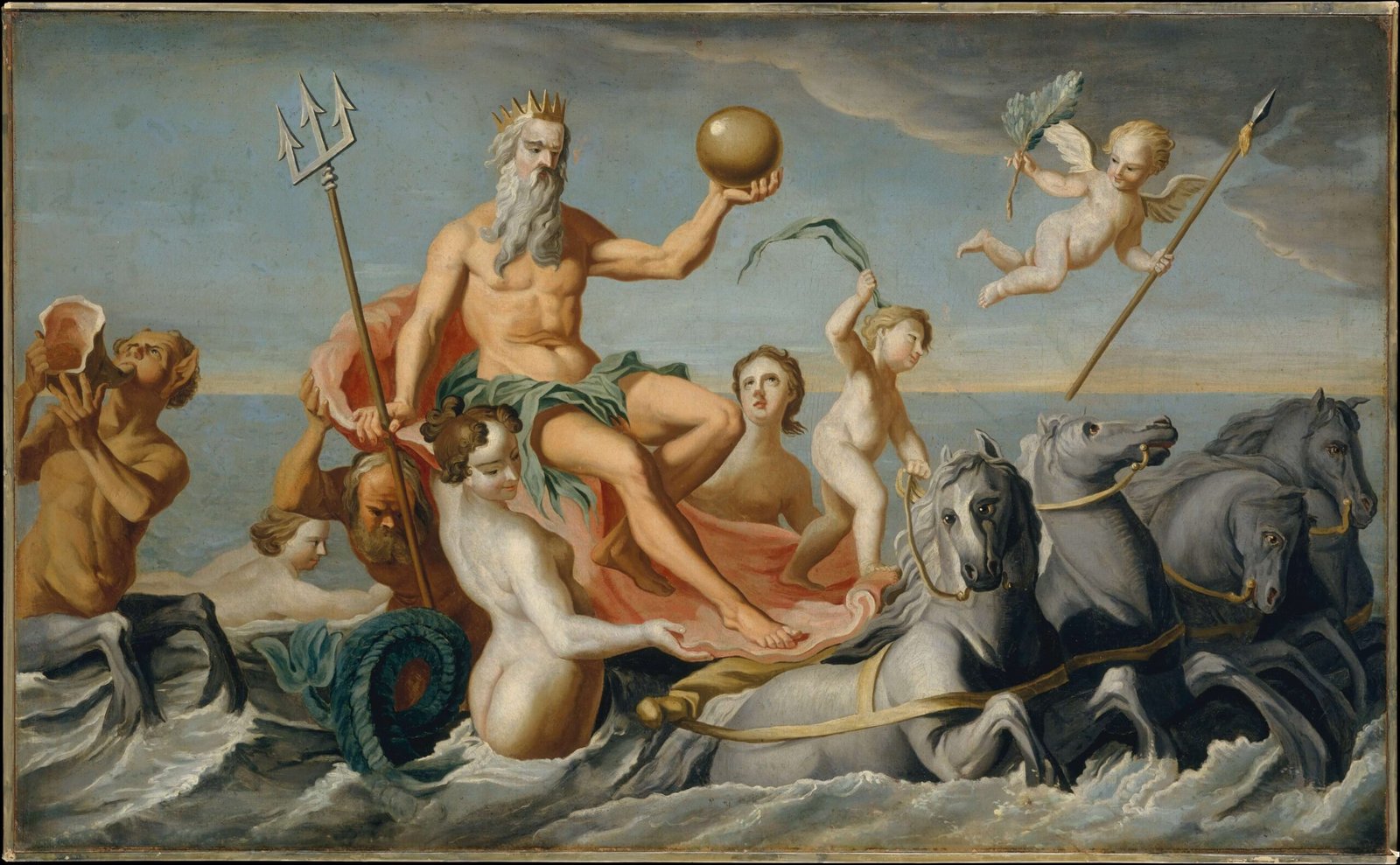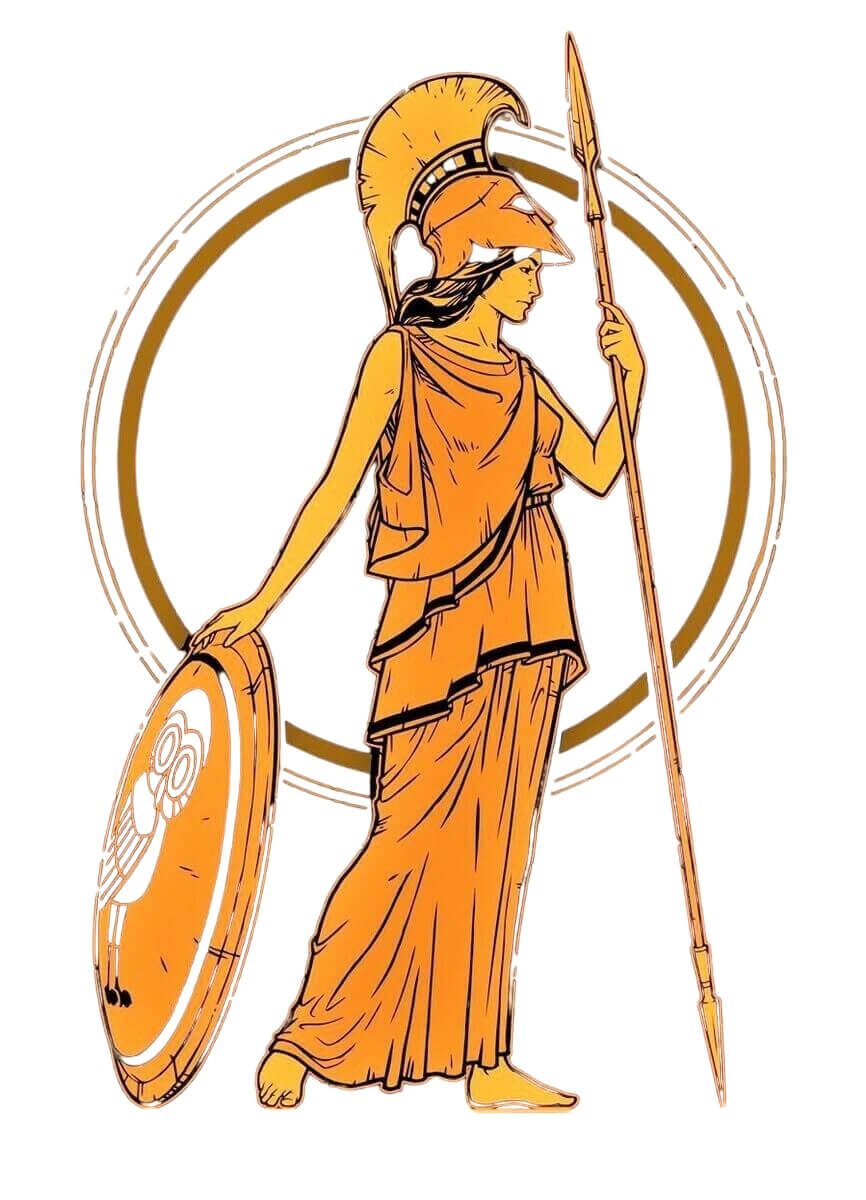Poseidon: Greek god of the sea and military democracy

Poseidon is the god of the sea, earthquakes, storms and horses in Greek Mythology. He is the brother of Zeus and usually an ambitious companion, or adversary of Athena, when it comes to the patronage of cities and heroes; their birth, origins and destiny. Theseus was Poseidon’s half-son and Odysseus had suffered from his persecution. According to Ovid, the god of the sea abused Medusa in the temple of Athena and the goddess of wisdom had turned her into a gorgon.
Poseidon and his son Triton
After the dethronement of Cronus, the world was divided by lot between Poseidon, Hades and Zeus. The king of Olympus received the sky, his brother Hades the underworld and Poseidon began to command over the sea, having the Mount Olympus and Earth in common ownership with his two brothers.
Deep beneath the water stands his beautiful palace. Poseidon rides a quick chariot drawn by amazing horses, meanwhile the waves move aside before him. Dolphins play merrily around their lord. When Poseidon shakes his trident, the underwater mountains suddenly rise to the darkened sky, making appear a fierce storm and white foam waves on the sea. At such moments the son of Poseidon, named Triton, a half-man, half-fish, becomes especially merry. Triton likes to frolic in the sea and plays a trumpet pipe made of a marvelous sea shell. He feels cheerful and greatly amused, but the sailors are not fond of his music. The sounds of the magic trumpet increase the terrible storm, raging on the sea, and the ships begin to sink.
Nereus and his daughters
Together with Poseidon and his wife Amphitrite, the elder Nereus, reigns in the depths of the sea. Nereus lives in the Aegean Sea with his wife Doris. He knows all the secrets of the future. However lies and deceits are not typical of the old man. He only reveals truth to the gods and mortals. Fifty of his beautiful daughters, called Nereids live with him.
The nereids splash merrily in the waves of the transparent Aegean Sea, shining like a pearl of divine beauty. Sometimes, they leave the sapphire blue of the sea, gathering together and spending their day in a mirthful dance on the coastal sand. Thereupon they take hands of each other and begin a funny round dance. Nereids are kind and compassionate. Therefore, they help the sailors so much as they can. They grant them a happy travel and sometimes save them from drowning during a storm.
The gray-haired old man Oceanus
The oldest of the sea gods is the gray-haired Oceanus. Therefore, he remembers those times when the Olympian gods were not even born. Oceanus is older than Zeus and Poseidon himself. He lives far away on the borders of the world and does not care about earthly events and sorrows.
Oceanus encompasses all the seas and lands with his waters. In fact, he also embodies the largest river in Greek myths. The old mighty titan has three thousand sons. They are the great river gods who command over the streams of the Greek rivers. Oceanus has also three thousand young daughters – Oceanides, goddesses of brooks and springs. They give people fresh water for joy and life. It feeds the entire earth and all the living things on it.
The Greeks honored especially these water deities in Ancient Greece. Insofar as they depended on fresh water and cared a lot about its abundance and quality.
On the other hand, Poseidon was Oceanus nephew and didn’t only took charge of the ocean. He also fulfilled the role of the saint patron of horses. For that reason, not only the sailors venerated Poseidon as their god, but also the horsemen.
Near the city of Corinth, the Greeks celebrated the festival of athletics and music in honor of the lord of the seas. They called it the Isthmian Games. Its main prize consisted in a wreath made of pine, considered as the sacred tree of Poseidon.
The Meaning of Poseidon in Greek Mythology

Meant to be the king of Olympus and supreme god in Ancient Greece, Zeus had turned into this type of deity that agglomerated the worst human qualities and never had respect for the lives of ancient Greeks. The man of Greece needed to blame someone and the supreme god was the final responsible of all his misfortunes and tragedies.
The Greeks had already set their mythology onto this kind of thinking. Insofar as they worshiped another gods and goddesses, who could overthrow Zeus. They did something amazing as storytellers and philosophers. Thus, the Ancient myths began to depict the war of supreme good against the socially accepted evil.
Thereafter, many Greek poets, philosophers and artists had glorified and strengthened this awesome message. They invented a greater philosophical meaning for the ancient legends and formed an amazing teaching about humanity. The man was superior and unique as an end and destiny. He could become a hero or god, by his own efforts and had many gods on his side. All them stood against the Supreme god of evil: Zeus – the wicked essence of the man itself.
Therefore, Poseidon and Athena competed one against another for the rule over an entire city such as Athens and craved to change to better the god of war Ares, who had personified the Spartan way of life. The both deites acted like the main adversaries and defeaters of Zeus. They symbolized two ancient ways of political government and social development, which could have been followed for the progress and steady success of humanity. Poseidon personified the wise military democracy and Athena – the government of scientists, philosophers and artists.
Poseidon as the necessary metamorphosis of Ares
The Greeks should engrave the name of Poseidon upon every spear and ship of Sparta. If not, Ares will drive the Spartans onto the vast deserts of the enraged barbarians and shortly afterwards the strongest Greeks will dissapear. For that reason, Poseidon is the god of the sea.
The art of sailing requires confident leadership and intelligent hierarchical distribution of the crew members upon the deck of a ship. As a matter of fact, the Spartan army cared a lot about self-achievement, and had avoided the discrimination of useful healthy people. However, the Spartans never cared about trade, arts, science and philosophical education. For that reason, they lost the impressive advantages and usefulness of social progress.
On the other side, the Greeks could have measured their social status and richness by means of military ranks, and not by the simple possession of money. This way, many unjust people responsible of corruption wouldn’t have been a problem for the Greek polis. And such a kind of civilization would have managed to be organized, disciplined and prosperous.
However, after having won the war against Athens, Sparta did not integrate wisely this new province and city onto their state. The prominent Spartan officers should have presided the government of Athens in collaboration with Greek philosophers and sages. Nonetheless, it never happened, because the Spartans never cared about trade, philosophy, science and arts. The integration of such a kind of disciplines onto the way of Sparta never had place.
On the other hand the Spartans never had respect to the Athenians and other Greeks. Thus, they didn’t complete their transition from the brave and furious warrior onto the wise leader of military democracy and Spartan float.
In fact, the warriors of Sparta could have made the Athenians lose their pride and need of national identity. They could have raised their children as Spartans, fond of the sword and blood of their enemies. The Newest Sparta could have conquered the entire Greece, Asia and countries on the farther side of the world. However, they never cared neither about Poseidon, nor Athena.
Poseidon as the wise future of Spartan Greece

Hypothetically speaking, Greek civilization could have been spread through and beyond its borders, meaningfully concerned about the integration of foreigner cultures and sovereignties onto the State of Sparta.
If some overseas nation has already a solid culture and plentiful democracy, they should be respected as a new destiny and consociate of trade and exchange. However, if evil tyrants govern such a foreign country the Spartans should overthrow them, taking advantage of the regional territories and resources, they would require for the establishment of the new Spartan province.
Thereupon the autochthonous dwellers need to be respected and rewarded with good life, palatable food, opportunities and employment. The Spartan state should recognize them as new Spartan citizens and afterwards introduce them onto the ways of Spartan military democracy.
On top of that, the social-economic hierarchy of military ranks and system of free choice between civil ranks and professions such as traders, craftsmen, architects, artists and scientists have to be open for the citizens of the new provinces. Never make enemies, there you can find friends and the new citizens of your nation.
Greater is your military rank, more money and goods you can obtain. The sea of Poseidon is plane and fair, there is no place for Athenian favoritism and corruption. The golden scarlet armours of Sparta make people be equal and disciplined. Henceforth they begin to have respect towards strength, virtue and self-achievement.
Thereupon wise Spartan officers should supervise and promote trade unions of merchants and craftsmen. Freedom of commerce and the invention of new astonishing wares are essential for the future of Hellas. The Greek ship used to have merchandise on its board, and sometimes lacked a particular direction. But Poseidon and Athena can lead Lacedaemon and its float to the right way and destination.
The contest of Athena and Poseidon
Once in time Poseidon and Athena had a strong dispute about the patronage of the city of Athens. They needed to offer a gift to its citizens so they could be chosen as the benefactor and name-giver.
Poseidon struck a rock with his trident and a spring of sea water gushed forth. But it was futile and useless, since the water was salty and not suitable for drinking. Nonetheless Athena stuck a spear into the stony barren earth, and for sudden it had been covered with beautiful greenish foliage. A wonderful olive tree grew up from the spear. The citizens of the city had been impressed and recognized Athena as the winner. The city was named after her.
As a matter of fact, the meaning of such a story, pretends to express and emphasize that Athena is more powerful and valid than Poseidon for the political guidance of human cities and mankind itself. Depending on different historic contexts and various kinds of human civilizations, the military democratic state by Poseidon can be advisable and necessary or completely useless.
But only Athena is indispensable. Inasmuch as the god of the sea is not even able to craft a fountain of fresh water without her. He is a pure salty spring of the ocean. Certainly as a reference to the fact that nothing amazing can be managed without science, art and philosophy. Nothing great is built without wisdom and its multifarious areas of knowledge.
